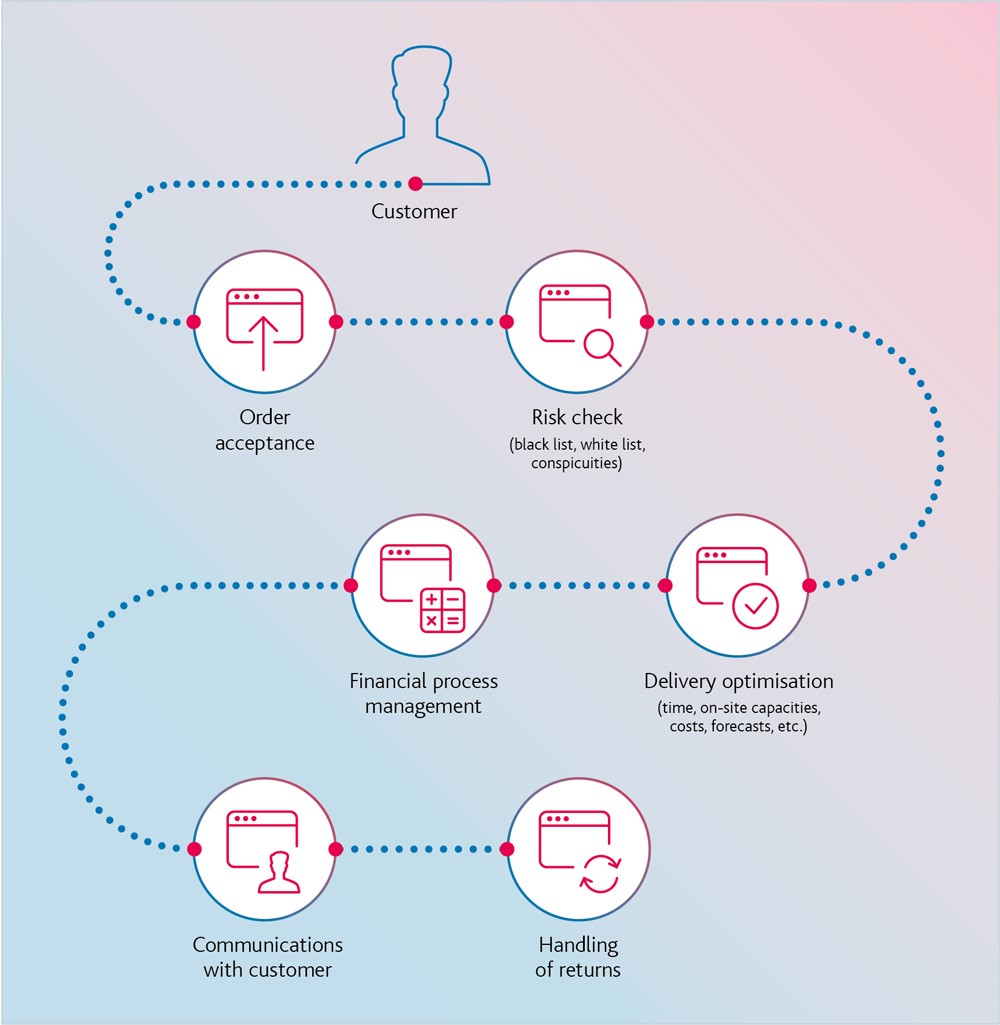
Distributed Order Management with aroma®
Centrally manage Omni-Channel & financial processes, inventory & fulfillment
Central Order Management: The Key to Improve Your Omnichannel Processes

In the Distributed Order Management System all stocks, delivery points, articles, orders and customers are kept.
The prototypical process ("happy path")
The Distributed Order Management (DOM) accepts orders from various channels, such as the e-commerce system or the branch, and ensures optimal processing. The typical process flow, if everything goes according to plan, is as follows:
- Order is accepted
- Risk check (black list, white list, abnormalities)
- Determination of the optimal place(s) for delivery of the order based on various criteria such as time, stocks, capacities at the place of delivery, costs, forecasts, etc.
- Controlling the financial processes, such as triggering the capture of an order with credit card payment after the order has left logistics or calculating the amount to be paid in case of a return.
- Triggering of various communication processes and information, in particular to end customers, such as information to end customers that a product has arrived at a store and can be picked up
- Handling of the returns process
Transparency & Overview Through Central Data Pools
In order to be able to optimally calculate and control the delivery of end customer orders, basic data are required which are kept in the Distributed Order Management (DOM). The most important "data pots" refer to the following areas:
Articels
All articles relevant to the end customer are stored in the DOM, typically with basic information such as texts and images, regions, start-end, article combinations, accessories etc.
Delivery locations
List of all locations from which articles are delivered, with master data and Omni-Channel relevant attributes such as geo-coordinates, opening hours or capacities.
Stocks
Current stocks of the relevant articles, including details of articles in transit and including non-physical articles such as services (e.g. bodywork services), gift cards or software rights.
Customers and Orders
Since the system controls the processing of sales orders, it must also know all purchase orders and the corresponding customers. Customer orders usually refer to several articles and therefore to different order lines. Customer data can be transferred from the relevant e-shop system and all other ordering channels as well as from the stores (POS systems).
Invoices, Prices, and Promotions
In addition to the physical delivery process, the system controls the respective financial process and accordingly creates data for a debtor management system, among other things. Therefore, all prices, taxes, and promotions are stored in the system or can be retrieved from other systems.
Order Splitting & Routing With aroma® Order Management
For omnichannel companies, it is essential to optimize the physical delivery and return process. Support for this is provided by the comprehensive business logics of aroma® Distributed Order Management, with one of the key functions being Order Splitting & Routing. This determines the best possible place to deliver the order based on many parameters:
Current stocks at the various storage locations
incl. own warehouses, goods at logistics service providers, goods in branches, goods at drop shippers, goods at other business partners such as franchise companies
Items in transit
Items in transit, for example, to a store or warehouse, may already be available for sale. These articles are considered in aroma®.
Stock reservations
for some business partners, such as marketplaces, stocks must be reserved. Such reservations are managed in aroma® and can be easily adjusted.
Capacities in stores
If articles are delivered from stores, you have to consider that not all stores have the same capacities to deliver articles. For example, large stores can pack and deliver more articles to customers than small stores. Such capacities are stored in the aroma® system and automatically taken into account.
Costs for delivery processes
Delivering an article from an e-commerce warehouse incurs different costs than delivering an article from a store. Cost items can be stored in the system and considered as optimization factor.
Priority of purchase orders
Orders from "Very Important Persons" are often to be treated with priority. These priorities are mapped in the aroma® system and taken into account when optimizing the delivery processes.
Further Functions of aroma®
For optimal control of delivery, finance, and service processes in omnichannel
-
Dropshipper
Many retailers work with so-called dropshippers, i.e. partners who keep articles in their own warehouse and forward them to the orders for these articles. Forwarding orders to business partners is relatively simple. It is also important and more challenging to support the business partners in processing the order. To do this, the partners need an easy-to-use system that they can use from a standing start without any installation or preparation. Arvato Systems provides the Drop Ship module from aroma® for this purpose. Of course, orders can also be transmitted to business partners simply via interface.
More information -
Financial Processes
In addition to the physical processes, the DOM also manages the financial processes relating to customer orders. These processes sometimes differ considerably depending on the payment method, country concerned and tax rates. aroma® supports these processes internationally. For this purpose, all prices and tax statements are kept in the system for the articles and orders. On this basis, the system generates the data records for the connected financial systems and, if required, also necessary documents such as invoices. Changes in VAT rates, which e.g. 2020 in Germany had to be implemented for a few months during the corona situation, can be easily configured in aroma®. Likewise, various payment options including ordering on account or mixed payment methods from credit cards and bonus points can be mapped. As the system keeps all relevant financial information available, it is also possible to calculate in the system what amount is to be paid out to a customer in case of returns. Less powerful systems often involve the shop system, which not only causes unnecessary data traffic but also problems in customer service. Only when the relevant financial information is available in Order Management, as in the case of aroma®, can customer service employees provide comprehensive information on financial topics.
-
Service Processes
E-commerce and Omni-Channel processes always cause a lot of work when unplanned events occur, e.g.
- an item that a customer has ordered is not available
- an invoice is not or only partially paid by a customer
- an incorrect item was delivered and the customer now wants a replacement item
- a delivery takes longer than planned
- a customer makes a charge back, etc.
Therefore, one of the most important tasks of a Distributed Order Management system is to support these service processes. Arvato Systems has developed and optimized aroma® over many years based on practical experience and thus helps to optimize service processes and implement them cost-effectively.
-
Reporting & Analyses
The control and optimization of delivery, finance and service processes is based on extensive data collection, reporting and analysis. One example is reports on the age of orders currently being processed. The longer an order is in the system, the higher the probability of customer escalation. The "age report" enables problems to be identified early on and proactively resolved.
Advantages of a Powerful Dom for You as a Trader
Frequently Asked Questions about Order Management
-
What is order management?
Order Management refers to the process of managing orders. It involves organizing and optimizing internal processes and coordinating various departments such as sales, warehousing and shipping. The aim of Order Management is to ensure that orders are processed efficiently and correctly and that the customer receives his order on time and in the desired quality. An effective Order Management solution helps to increase customer satisfaction while reducing process costs.
-
Why do I need an Order Management System?
An Order Management System is indispensable for companies to automate and optimize the entire ordering process. It is the central platform for managing orders and exchanging data between different departments and systems. An Order Management System enables companies to reduce process costs and increase customer satisfaction by:
- ensuring greater accuracy in order processing
- enabling faster processing of orders
- providing more efficient inventory management and optimization
- enabling real-time insights into orders and inventory
- enabling seamless integration of different sales channels and marketplaces
-
What are the 3 most important KPIs in order management?
The three most essential KPIs in Order Management are order cycle time, inventory accuracy, and delivery reliability.
Order cycle time is the time it takes to complete an order from intake to delivery. Inventory accuracy measures how accurately inventory levels are managed to avoid shortages and overstock. Delivery reliability refers to how reliably orders are delivered at the agreed time. These KPIs show the effectiveness of order management in meeting customer requirements.
Your Contact for Distributed Order Management mit aroma®



